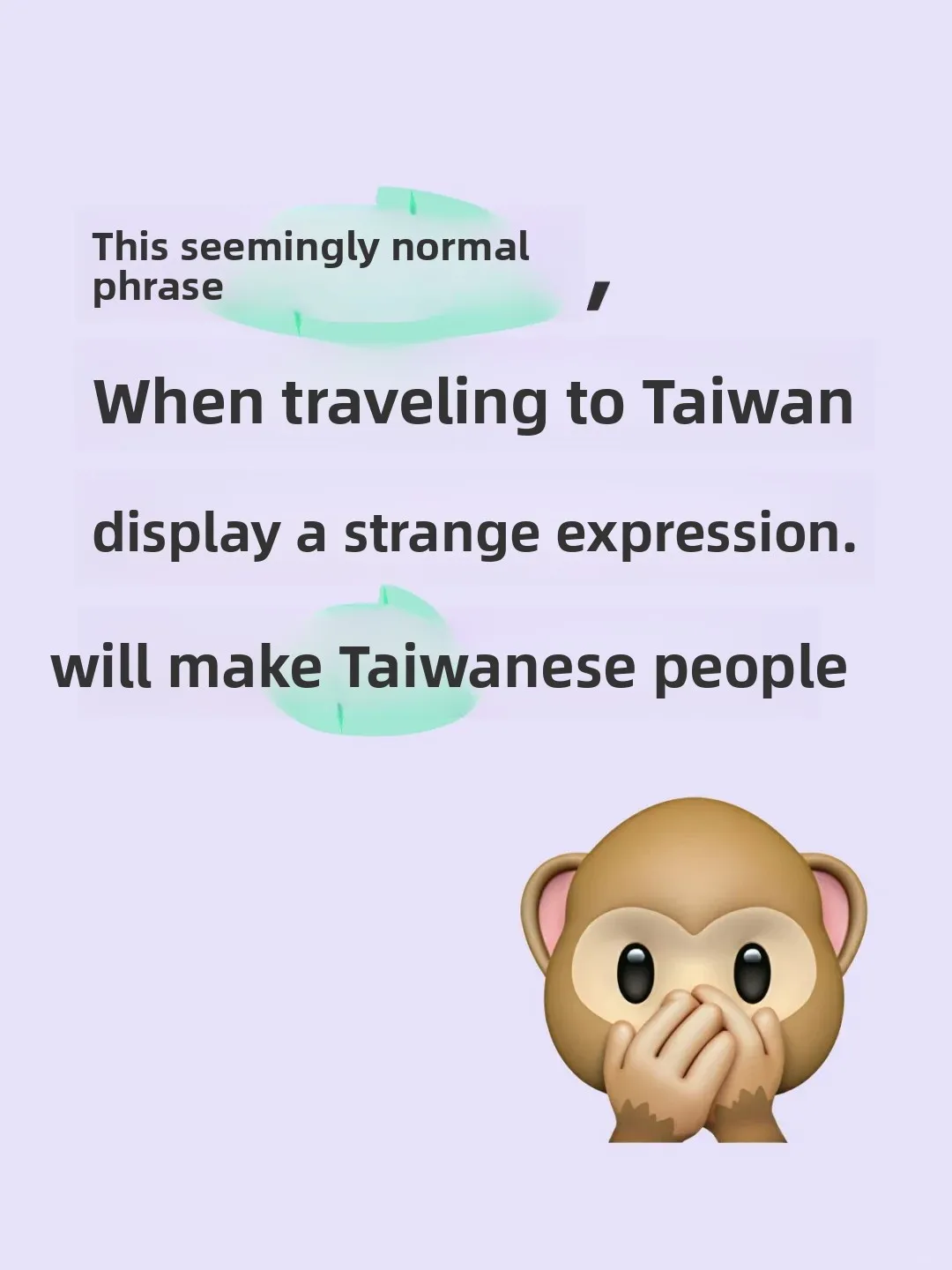Phrases That Make Taiwanese People Go: 'Wait, WHAT?!'
-

Hey, folks planning to visit Taiwan! Pay attention! There are a few phrases that might earn you a "You're serious?" look from locals if you say them in Taiwan. Want to fit in more like a local? Check it out:
-
When talking about accommodation, never tell people you want to go to a “hotel”!
- Oh man, this one’s super important! In Taiwan, if you tell a taxi driver you want to go to a “hotel” (jiǔ diàn), they may take you to a place where ladies in skimpy outfits will entertain and drink with you. That's definitely not the place we'll be sleeping at.
- What you should say: You want to go to a “guesthouse” (lǚ guǎn) or a “restaurant/hotel” (fàn diàn). These two actually refer to our everyday hotel stays.
 ️ Warning, remember, in Taiwan, “hotel” ≈ nightclub or special service places. To avoid embarrassment, please use “guesthouse” or “restaurant/hotel”.
️ Warning, remember, in Taiwan, “hotel” ≈ nightclub or special service places. To avoid embarrassment, please use “guesthouse” or “restaurant/hotel”.
-
Don’t call women “sisters,” “beautiful lady,” right off the bat!
- I know it’s all friendly in China, but in Taiwan, calling strangers (especially servers or store employees) “sisters” (xiǎo jiě jie) or “beautiful lady” (měi nǚ), may make them feel like you’re coming on too strong, or not respecting their personal space.
- Better options: Regardless their age, you can call them “miss” (xiǎo jiě) or use their title, like “server,” “store associate,” or “Mrs.” (a male/female operator depending on gender).
 ️ TIP, using “miss” or their title avoids coming off as being intrusive or disrespectful when you aren’t close.
️ TIP, using “miss” or their title avoids coming off as being intrusive or disrespectful when you aren’t close.
-
Avoid using “dear sir/madam,” it sounds weird!
- “Dear” (zūn jìng de) at the beginning of sentences in Taiwan will make people feel like you’re joking or sarcastic. And if they laugh but have to hold back, it does get somewhat awkward.
- Suggested alternative: Just calling by name or surname followed by their position/title is fine, like “Mr. Chen,” “Miss Wang,” etc. Save this very formal way of addressing for super-formal written contexts.
 ️ Watch out, overly formal terms during casual communication can create distance and even misunderstandings. Be more natural!
️ Watch out, overly formal terms during casual communication can create distance and even misunderstandings. Be more natural!
Hope these little reminders help you enjoy a much more authentic local feeling in Taiwan! #Language, #Like-a-local travel advice, #Thoughtful sharing, #Taiwan and Mainland China differences
-
-
Thanks everyone for the lively discussion. The point of my post is this: Imagine you're in Taiwan for business. At a client dinner, he suddenly gives you a suggestive smile and says, 'Let's go to a 'jiǔdiàn' (酒店 - hotel) and have some fun later.' At this point, definitely don't assume he means your accommodation for some same-sex fun. As for using 'respected' (尊敬的), sure, Director Dai won't mind. But it just reminds me of when I told a friend, 'Tonight's dinner is canceled because the 'respected' Director Dai needs me to work overtime, and humble me has no choice but to obey.' Many of the rank and file (牛馬) would chuckle, but they'd be mocking Director Dai, definitely not you.
-
If I said 'the respected Director Dai needs me to work overtime,' it would definitely be sarcastic too.
-
I also really hate it when people call me 'xiǎojiějiě' (小姐姐 - little big sister). If it's a business contact, it's unprofessional. If it's a stranger, it's impolite and too flippant.
-
Exactly, the internet teaches all sorts of nonsense. When I'm in mainland China, I don't even know how to address unfamiliar women anymore.
-
What you call 'jiǔdiàn' (酒店 - hotel), we [in Taiwan] usually call 'fàndiàn' (飯店) for accommodation. 'Lǚguǎn' (旅館) usually refers to lower-grade lodging.
-
Lower-grade lodging in mainland China is called 'zhāodàisuǒ' (招待所 - guesthouse). Regular accommodation is 'bīnguǎn' (宾馆). Not that many people actually say 'jiǔdiàn' (酒店) [for accommodation].
-
Your terms sound so old-fashioned... and you get shocked too easily. In mainland China, nothing really fazes us because there are so many provinces, and we're very aware that language habits differ everywhere. We wouldn't be shocked by a non-local usage.
-
Mhmm, yeah. Someone above mentioned going for an interview at a Taiwanese company, being called 'Miss C,' and said it was terribly cringeworthy.
-
Oh, give me a break! I went for an interview at a Taiwanese company, and they called me 'Miss X.' I almost died of cringe!
-
Where I am, everyone, regardless of age, is just called 'jiějiě' (姐姐 - older sister).
-
It's because 'xiānsheng' (先生 - Mr./sir) corresponds to 'nǚshì' (女士 - Ms./madam). 'Xiǎojiě' (小姐 - Miss) kind of pairs with 'xiǎogē' (小哥 - young man/bro), which feels a bit neither here nor there, too casual.
-
Nobody actually says 'xiǎogē' (小哥 - young man/bro). 'Xiǎogē' is only for Fei Yu-ching, okay?
-
So, what are Taiwanese 'jiǔdiàn' (酒店 - places for drinking and business entertainment) called in mainland China?
-
A mainland netizen just commented, saying 'nightclubs' (夜店 - yèdiàn).
-
If you're on the street and don't know how to address someone, just say 'Nǐ hǎo' (你好 - hello) + 'Bù hǎoyìsi' (不好意思 - excuse me). Simple and easy.
-
Just call out 'Měinǚ!' (美女 - beautiful woman).
-
You guys [in mainland China] might say 'lǎopó' (老婆 - wife), 'nǚpéngyǒu' (女朋友 - girlfriend), or 'xífù' (媳妇 - wife/daughter-in-law). But for us [in Taiwan], 'xífù' (媳妇) is typically how parents-in-law refer to their daughter-in-law (as 'érxífù' or 'xífù'). Husbands just call their wives 'lǎopó' (老婆).
-
Actually, this also varies by region. Plenty of people say 'lǎopó' (老婆 - wife). Different places have many different terms.
